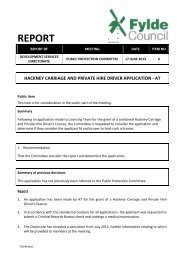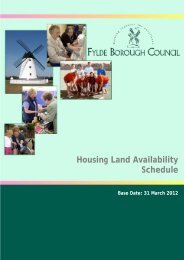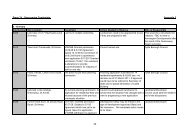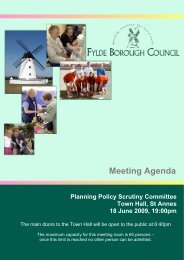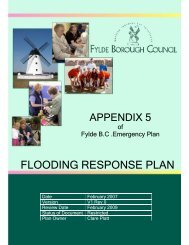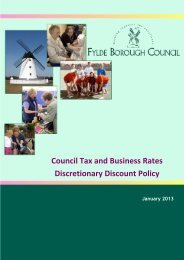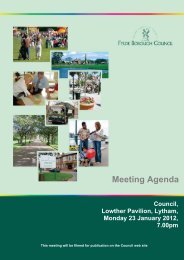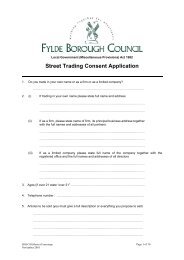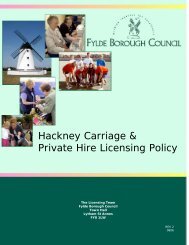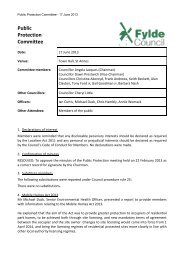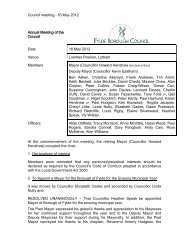Emergency Plan - Fylde Borough Council
Emergency Plan - Fylde Borough Council
Emergency Plan - Fylde Borough Council
Create successful ePaper yourself
Turn your PDF publications into a flip-book with our unique Google optimized e-Paper software.
<strong>Emergency</strong> <strong>Plan</strong> February 2007<br />
APPENDIX 9<br />
SAFETY OF EMERGENCY CALL OUT STAFF<br />
The <strong>Council</strong>’s Health & Safety Policy as well as current legislation still apply throughout the<br />
duration of an incident and should be applied to all activities undertaken. The Health & Safety<br />
at Work Act requires all employers to follow safe working practices as far as reasonably<br />
practicable. Managers should undertake appropriate risk assessments of working conditions,<br />
requirements for suitable equipment and personal protective clothing, etc and advise their<br />
staff of potential risks and necessary counter-measures if they become apparent.<br />
The normal risks involved when travelling to and from work, the time of day, mode of transport,<br />
etc., are every employees own personal responsibility. When contacted at home or elsewhere<br />
and requested to attend an incident, the employee is deemed to be at work. This applies not<br />
only to the work location, but also the journey there and back. Personal safety risks that exist<br />
may be equal to, or exceed those in a normal work environment. Travelling, or working alone<br />
may increase the risks still further. <strong>Emergency</strong> staff and their line management must be aware<br />
of these extra risks and try to eliminate, or reduce them.<br />
Some of these risks may be:-<br />
• Communications, travelling to, from or at the incident.<br />
• Inclement weather conditions, the time of day and the job with regard to the personal, or<br />
protective clothing /equipment required.<br />
• The chosen mode of transport and the prevailing road conditions.<br />
• Personal safety and security.<br />
• Any medication or alcohol consumed previously, which may effect them whist driving or<br />
working.<br />
When contacted and before leaving home:-<br />
• Check who is calling, and where requested to attend.<br />
• Always provide the caller with the details of the transport and route to be used and an<br />
estimated arrival time.<br />
• Dress for the prevailing weather conditions, the job and its possible duration.<br />
• Take, ID, Money/cash card, mobile phone, pens and paper.<br />
• If possible, inform someone at ‘home’ of all the above or leave a note.<br />
On arrival at the designated location:-<br />
• If a motor vehicle is used, park and secure the vehicle in a sensible and well-lit location.<br />
• Confirm a safe arrival with someone at home or your line manager,<br />
• Report to the officer in charge before getting involved;<br />
• Always remember that those involved in an emergency may be distraught, traumatised<br />
and mentally or physically unstable. They may not realise that you are a volunteer and<br />
there to help them. You may therefore be subject to abuse and assault, so, be as<br />
considerate and helpful as possible, but aware of any possible risks.<br />
• Opportunist thieves are just as likely to be active during an emergency as at other times,<br />
so keep personal possessions close to you, or have them secured. Your person only is<br />
fully insured by your employer during work periods, not your personal possessions.<br />
When leaving the incident and returning home.<br />
• Don’t drive if over-tired, feeling unwell, or if alcohol or medication has been consumed.<br />
• Inform the person in charge or your line manager that you are leaving, again giving your<br />
mode of transport, route, destination and E.T.A. and remember to report your safe arrival.<br />
Appendix 9 Uncontrolled if Printed Rev.0<br />
1



